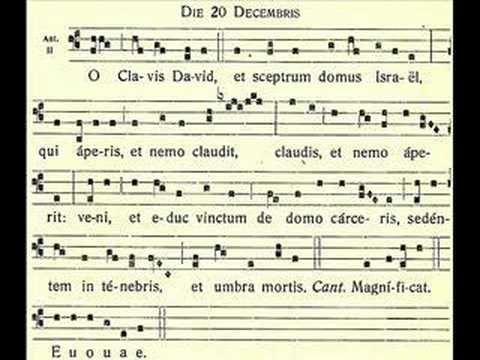
I hear and read people referring to the use of the O Antiphons – especially in explaining the origin of “O come, O come, Emmanuel” -in the past tense (“these were used…”). Well, yes, they were. But they still are being used. I use one of the O Antiphons each evening, praying it before and after the Magnificat.
The most-used shared daily reading of the scriptures is the daily eucharistic lectionary. From 17-24 December it is linked to the dates, not to the days of the week. And each set of readings has its own Gospel Acclamation, the Gradual Alleluia Tract.
On 20 December this is, depending on its translation:
Alleluia, alleluia.
O Key of David,
opening the gates of God’s eternal Kingdom:
come and free the prisoners of darkness!
Alleluia, alleluia.
or
Alleluia, alleluia!
Key of David,
who open the gates of the eternal kingdom,
come to liberate from prison
the captive who lives in darkness.
Alleluia!
So even those who do not pray the evening office encounter the image in each O Antiphon day by day as they celebrate daily Eucharist.
From at least the eighth century the antiphon before and after the Magnificat at Vespers (Evening Prayer), for the seven days leading up to Christmas Eve, has greeted Christ with a title starting with “O”. These became the basis of the popular carol “O come, O come, Emmanuel”. The initials across the seven days, when read backwards, form the Latin “Ero Cras” which means “Tomorrow I come.” [The NZ Lectionary has “O Sapientia” on December 17, but no other mention of the O Antiphons whatsoever – I sincerely wonder what the majority make of this “O Sapientia” in that text!]
December 17: O Sapientia (O Wisdom)
December 18: O Adonai (O Lord)
December 19: O Radix Jesse (O Root of Jesse)
December 20: O Clavis David (O Key of David)
December 21: O Oriens (O Dayspring)
December 22: O Rex Gentium (O King of the nations)
December 23: O Emmanuel (O With Us is God)
The alternative English medieval practice would have
December 23: O Virgo virginum (O Virgin of virgins)
For that English medieval practice, reading the first letters in reverse Virgo Emmanuel… cutely results in Vero cras, “truly, tomorrow (I come)”!
Each day an O Antiphon could be used for prayer and reflection. These could form the basis of an Advent service with readings, music, and singing. Or of art, banners, or other ways of enhancing the worship environment symbolically. The carol “O come, O come, Emmanuel” and the Magnificat could form significant features in this.
O key of David and sceptre of the House of Israel;
you open and none can shut;
you shut and none can open:
come and free the captives from prison,
and break down the walls of death.
Amen. Come, Lord Jesus.
[…come, and lead the prisoner
from jail.
seated in darkness
and in the shadow of death.]
O Clavis David,
et sceptrum domus Israël,
qui aperis, et nemo claudit,
claudis, et nemo aperuit:
veni, et educ vinctum
de domo carceris,
sedentem in tenebris,
et umbra mortis.
Isaiah 22:22; Revelation 3:7
O come, thou Lord of David’s key!
The royal door fling wide and free;
safeguard for us the heavenward road,
and bar the way to death’s abode.
Rejoice! Rejoice! Emmanuel
shall come to thee, O Israel.
O come, thou Key of David, come,
And open wide our heavenly home;
Make safe the way that leads on high,
And close the path to misery.



My most favorite rendition of the Advent carol;
https://youtu.be/AdR79P-2ewo